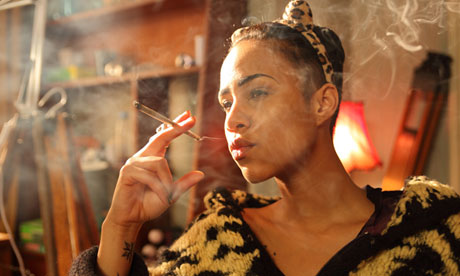
Fresh Meat (Channel 4) has clearly eased into a higher gear for its second series. Nothing else on telly is so comically dense: jokes pile up quickly, and you always risk missing something funny by laughing. It's a brilliant mixture of intelligence and idiocy, deploying complex, evolving characters who can still occasionally sum themselves up in one line ("Insufficient funds," says Oregon, staring at a cashpoint screen. "What does that mean?").
The tension has been taken up a notch by the introduction of two new characters: Heather and Sabine. While the housemates we know well become increasingly transparent, these two are freshly opaque. Kingsley, as you might expect, is so keen to believe that Heather is stalking him that he's disappointed when he can't find her anywhere. ("Today," says Oregon, "it's almost like you're stalking her.") But we can't quite discount the possibility that Heather actually is stalking him. We see her largely through his eyes, and she does seem a tiny bit weird.
Howard's recent mugging has the entire household on high alert and misusing their free rape alarms. JP, who's come down with mumps, tries to use his to order soup from downstairs. "I'm sort of being raped by my lack of soup," he says in his defence. Unrepentant, he insists that Vod carry an icetray full of his sperm down to the freezer, in case the mumps make him infertile. I missed what happened next, from laughing.
Meanwhile, Dutch housemate Sabine, who looked set for an unceremonious exit last week, has established herself as an immovable force. As she's utterly straightforward and without guile, no one knows quite what to make of her. "I don't not like her," says Kingsley. "But I also don't like her."
It is a testament to the show's assured execution that the main characters, despite operating only in accordance with their basest motives, all remain extremely endearing. Except, perhaps, the initially sweet-natured Josie, who may be turning into the most calculating housemate of the lot. "I think you're not a nice person," said Sabine, after Josie broke Heather's arm. I found myself thinking the same thing.
I used to be quite good at equations and stuff 30 years ago, but I abandoned it all to become an English major and live in contented wooliness, grateful never to have to show my workings again. As a consequence I forgot everything. When it comes to explaining complex scientific principles on telly, you can't dumb it down enough for me. In Order and Disorder (BBC4), presenter Jim Al-Khalili treated us to a few equations, but they were always evanescent – he wrote one in heat, using a hairdryer – fading immediately as if to assure the viewer that none of this would be on the test.
The history of thermodynamics is populated with pioneering scientists whose names I have never before been obliged to spell: Sadi Carnot, Boltzmann, Clausius. Theories about the nature of energy as a "living force" – a physical substance that could be transmitted from one object to another – gave rise to mechanical advances like the steam engine, which in turn gave us a model for the operation of the universe. To be honest, I'm not sure I've got that right.
Al-Khalili is an engaging presenter who gave every impression of being able to make the immensely complicated understandable, but I wasn't left with a great deal more understanding at the end. Instead I was obliged to make due with his distressing take-home message: "The universe itself must one day die." All we're doing, he says, is "trying to preserve a tiny pocket of order in a cosmos that's falling apart". It's always worth having that at the back of your mind. Order towards disorder: that's the way everything is moving. And in my case, from intelligence towards stupidity. I'm sure there's an equation that proves it.
In Freddie Mercury: the Great Pretender – an Imagine Special (BBC1), a lot of unseen and little-seen footage was used to flesh out the private side of the Queen frontman. What is immediately striking is that even at the height of his fame, he remained, beyond his stage persona, almost unknown. I hardly knew what his speaking voice sounded like. In interviews he came across as guarded, demure and completely charming. The highlight was a tiny snatch of his unreleased duet with Michael Jackson, which sounded good, and might have made it on to Thriller had they finished it. But Jackson kept bringing his llama to the studio, and Mercury decided he didn't want to hang out with a llama. I think, on balance, he made the right decision.

